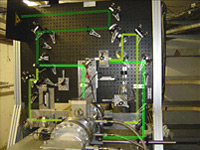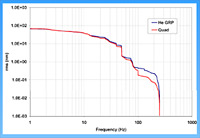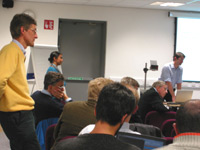 |
 |
|||||||||||||
|
|||||||||||||
|
|||||||||||||
|
Almost three years after EuroTeV (The European Design Study Towards a Global TeV Linear Collider) convened for the very first time at Daresbury Laboratory in February 2004, the collaboration met once again this past week amidst the rolling green hills and gusting gales to acknowledge programme accomplishments and discuss plans for the future. EuroTeV is a 'design study' approved by the European Commission FP6 programme with an original lifespan of three years. It is addressing critical ILC R&D issues in aspects of beam dynamics, the beam delivery system, damping rings, the positron source, instrumentation systems, metrology and vibration stabilization. It is also investigating possibilities for future remote ILC operations via the 'Global Accelerator Network' concept. The Commission recently issued first calls under FP7 for new project proposals for 'preparatory phase' studies of major projects in the period 2008-13, and these are due in early May. The EuroTeV collaboration has hence started to think about how best to participate in ILC bids during this next funding period. "We should be positive and aim to capitalise on FP7 to make a strong and substantial European contribution to the ILC Engineering Design Report," said Phil Burrows of the John Adams Institute at Oxford University, during the meeting's summary talk. "We should determine what aspects of what we are doing in EuroTeV currently can contribute to this next phase." In looking back on the past few years, Burrows described the visible success of the EuroTeV R&D programme, which has helped the global ILC project to advance. The programme has provided European focus for collaboration on major aspects of the ILC machine and also brought together groups from multiple universities and large laboratories within Europe. Burrows specifically highlighted EuroTeV's contributions to ILC test facilities at KEK and SLAC. "There is a huge amount of effort at labs in Europe, and we have played a major part in test facilities in Asia and the US," Burrows said. "This shows the global impact of EuroTeV contributions, which was part of the original motivation behind the FP6 scheme." As the GDE will shortly shift into a new engineering phase for the ILC, a period that will include focussing worldwide R&D to better define and advance the technical components of the machine, the regional collaborations must prepare themselves for this next exciting phase. "We need to make sure our efforts are consistent with the GDE plans as we move forward," Burrows said. "In Europe a key part of this strategy will be to optimise our bids to FP7 to secure resources for ILC preparations. Building on the achievements of our FP6 programmes such as EuroTeV is a great way to start this process.' All talks from the meeting are available online. EUROTeV will hold its next scientific meeting during the forthcoming LCWS07 workshop in Hamburg.-- Elizabeth Clements |
|||||||||||||
| © International Linear Collider |


